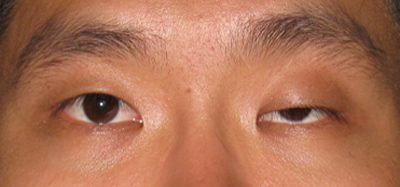|
Droopy eyelid
Droopy eyelid is also known by the medical term
ptosis. It is a common eye condition and can fall into 2 major
categories:
-
Congenital ptosis which will have been apparent since
birth. Usually it is due to abnormal development of the levator
muscle in the eyelid.
-
Acquired ptosis tends to become apparent in later
life and can be linked to involutional/ageing changes, lid trauma,
eye surgery, neurological or muscular conditions.
|

This 25 year-old man developed a stye in his
upper eyelid 12 months ago. The stye became infected and
caused severe upper eyelid swelling. On recovery, the left eye
became smaller and failed to improve with time. The cause is
due to disinsertion (loosening) of the muscle (levator
superioris) that normal opens the eyes.
|
|

This 6 year-old girl had had a smaller left
eye since birth. The eyelid covered the pupil and can cause
lazy eye (amblyopia) as the eye had problems seeing clearly.
Early operation is essential to allow the eye to see clearly
and prevent lazy eye. |
These are carried out by an ophthalmologist and include
a full history of the condition; eye examination; visual acuity test;
examination of eye movements.
Lid measurements will be taken to accurately measure the degree of lid
drooping and amount of muscle function in order that plans can be made
for the best mode of treatment. This often involves a surgical
operation.
Treatment
The timing of this can vary. In children if there is no
sign of the development of amblyopia (lazy eye), then an operation is
often delayed until the age of 3 or 4 years.
In most cases the operation will involve strengthening the levator
muscle in the eyelid. In very severe ptosis then surgery involving the
muscles above the eyebrow is performed. The latter operation will
involve using either foreign material or tissue from a donor site,
such as from the leg to form a connection between the muscles in the
eyelid and eyebrow. In nearly all cases of ptosis in adults, surgery
is performed with a local anaesthetic.
Any skin sutures are normally removed after approximately 2 - 6 weeks
depending on the type of operation performed.
After the operation, it is normal for a “pressure dressing” to be left
in place for a few hours. This normally consists of eye pads and
elastoplast which is firmly applied. This is intended to minimise
post-operative swelling and bruising.
It is normal for antibiotics, in either drop or ointment form, and
lubricating drops to be prescribed for after the operation.
As the local anaesthetic starts to wear off, it is quite common for
the eyelid to ache. This requires mild painkillers such as paracetamol
for relief.
If you like to view the actual operation, please the
picture below. (Warning: Actual Surgery
Shown).
What to expect
Initially the eyelids are often bruised and swollen. This can take up
to 2 - 3 weeks to completely clear up. It is often too early to judge
the final outcome immediately after surgery, although every attempt is
made to achieve the best cosmetic outcome for each individual.
The following pictures are some
patients who had had eyelid surgery to lift the droopy eyelids.
|

A 72 year-old woman has
problem seeing due to severe drooping of the eyelids. The droopy
eyelids appeared following cataract surgery and most likely due
to loosening of the muscle that lift the eyelids. The right
picture was taken one week after the operation.
|
|

A 65 year-old man had
problem seeing objects due to severe droopy eyelids. He also had
to tilt his head backward to see clearly. The right picture was
taken immediately after surgery.
|
|

A 63 year-old woman
always tilted her head to see things due to severe droopy
eyelids. This caused neck pain and problem with walking. The
right picture was taken one week after the correction.
|
|

A 42 year-old man
complained that he appeared tired and had problem seeing through
his right eye. He had droopy eyelids in both eyes more on the
right than left. Surgery was carried out to correct the droopy
eyelids and at the same create double eyelids in both eyes. The
right picture was taken 4 weeks after the operation.
|
|

This 4 year-old had
left droopy eyelid since birth. The right picture was taken 6
weeks after lifting the eyelid.
|
|

This 61 year-old woman
had severe droopy eyelids making it difficult for her to walk
about. The right picture was taken 3 weeks after surgery.
|
|

This 26 year-old had
severe drooping of her right eyelid since birth. The right
picture was taken immerdiately after the correction.
|
|

This 3 year-old boy was
born with droopy left eyelid. The right picture was taken 2
months after eyelid surgery.
|
|

This 40 year-old woman
had right droopy eyelid for the past 5 years. The right picture
was taken 3 weeks after the operation.
|
|

This 80 year-old man
has problem seeing due to severe eyelid drooping more so on the
left than the right. The right picture was taken 3 weeks
post-operation.
|
|